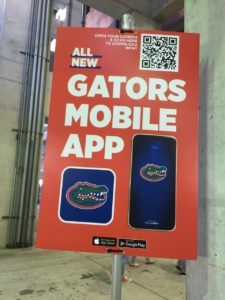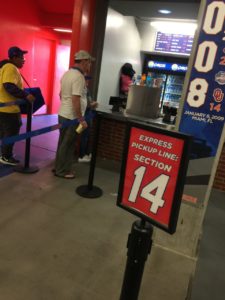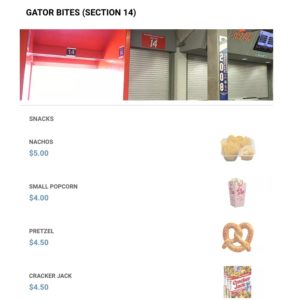
VenueNext powers a new app at the University of Florida’s Ben Hill Griffin Stadium, where it also debuted new products like a POS system and a web-based app. Credit all photos: Paul Kapustka, MSR (click on any picture for a larger image)
Though the company hasn’t completely given up on building team and stadium apps, executives at VenueNext pointed toward the company’s partnership with the University of Florida as a good example of its new strategic focus. In addition to providing the school with a stadium app that launched this fall, VenueNext also debuted its back-house point-of-sale transaction system at Florida, as well as a web-based app for stadium services and purchases. According to VenueNext executives, the new offerings are part of a new focus on mobile transactions, one that de-emphasizes the company’s former goal of providing full-service, custom-built apps with a wide range of features, including concessions ordering, instant replay video, venue wayfinding and loyalty programs.
Cailen Wachob, VenueNext’s executive vice president for sales, retention, marketing and operations, said “we’ve been pretty quiet about it” in regards to the company’s new offerings and strategies. Originally launched as the provider of the team and stadium app for the San Francisco 49ers and Levi’s Stadium, VenueNext raised $24 million in venture funding to fuel a push into what looked like a burgeoning market for team and stadium apps as venues became increasingly connected.
After an initial flurry of professional team customer wins, including other NFL teams like the Minnesota Vikings, NBA teams including the Orlando Magic, Minnesota Timberwolves, Charlotte Hornets and Utah Jazz, and the NHL’s San Jose Sharks, VenueNext did not have any big-name announcements in the past year. In mid-2018, VenueNext founding CEO John Paul was replaced by Anthony Perez, former chief marketing officer for the Orlando Magic, a point at which the company “took a step back to look at what we wanted to do, moving forward,” Wachob said.
What that turned into was a new focus more on helping teams, venues and events with mobile commerce activities, rather than a strict direction of just providing a do-everything app with bells and whistles like instant replay video. That combination proved alluring for Florida, which is VenueNext’s first big-college customer.“We wanted to pick a lane and focus on that, rather than be a custom developer shop,” Wachob said. That means that while VenueNext will still build team apps, it may use third-party functionality as needed.
“We’re more focused on the venue commerce utility,” Wachob said. “We’re not going to be focused on building out things like replay and video.”
Tough market, lots of competition
Since VenueNext’s launch, the stadium and team app has gotten extremely competitive, with multiple players joining the game. Early market leader YinzCam remains the player with the most customers, but it has been joined by a list of providers that includes Venuetize, Hopscotch, Built.io and Rover.io as well as older apps from operations like CBS Interactive and Sidearm Sports. The problem all app providers face, however, is the lukewarm adoption of stadium apps by fans in general. While teams and venues all tout the idea of a stadium app as a way for fans to have a so-called “remote control” for their game-day visits, the reality is that most fans don’t download or use the apps widely, except when forced to for things like digital ticketing.
While teams and venues (and the app providers) may claim that fans use stadium apps, the reality is that actual statistics for fan app use are rarely ever provided. In the few instances where teams or venues do provide statistics for things like app usage at games, team and stadium apps fall far behind general-purpose mobile apps like social media apps, email and application updates.In-venue transactions, however, do offer a way for teams and venues to lure fans to an app or web platform, either by requiring it (in the case of digital ticketing) or by making it an attractive feature, by supporting things like in-seat delivery, raffles and games, order-ahead concessions or in-venue “experience” purchases like seat upgrades or things like on-field tours, or meet-the-players gatherings.
VenueNext famously had an ambitious goal of providing in-seat concessions delivery services for all seating areas at Levi’s Stadium, but that program was shelved in 2017 after limited use and challenges in providing the service to 70,000-plus potential customers.
What has emerged in the market as a more manageable solution are less-ambitious programs like offering delivery to limited seating areas (usually premium club areas) or mobile order-ahead services with express window pickup. The app for Florida’s Ben Hill Griffin Stadium offers the latter, with several areas around the venue having pick-up windows set aside for the mobile orders.
POS, kiosk ordering and web-based apps
Wachob said that Florida was also the first live customer for VenueNext’s new POS software system, a product that puts VenueNext into competition with players like Oracle’s Micros and Appetize. The system supports 180 different stands at Ben Hill Griffin Stadium, which Wachob said had previously used a cash-drawer system. VenueNext’s website also now includes promotion of kiosk-based self-serve concession systems, a rapidly growing service in sports venues.
VenueNext also rolled out its first live web-based app for Florida, where fans can interact with venue services without having to download an app. Once an unthinkable move for a company devoted to apps, the new service even has its own name and website, ordernext.com, linked to the main VenueNext site. The ordernext platform at Florida provided a way for fans to simply click on a link that said “Water Me” to get cold water delivered to seats in the stadium’s sunny section. Wachob said the site also allowed fans to purchase in-venue experiences, like an on-field pass or a visit with the Gator mascots.
“The new app and POS technology makes concessions better for everyone, it’s faster for those who order ahead of time, and the lines are shorter,” said Scott Stricklin, Florida’s athletic director.
The ordernext platform puts VenueNext into direct competition with providers like Rover.io, which tout the fast performance and greater flexibility of a web approach as opposed to a standalone app. Notably, Rover lists the Vikings and the Hornets as customers, even though those teams also have a VenueNext app. Stadium tech integrator AmpThink helped launch a similar program a year ago at Texas A&M, where the 12thmanlive.com site provided quick links to contests, discounts and other game-day activities.
To VenueNext’s Wachob, not being religious about whether services are offered in an app or on the web is part of the company’s new focus on mobile commerce first.
“Sometimes fans at the venue might not want to download the app,” Wachob said. “The ability to just go to a site [for a transaction] is really powerful. That’s the power of mobile — allowing the fan to determine what’s important to them.”








